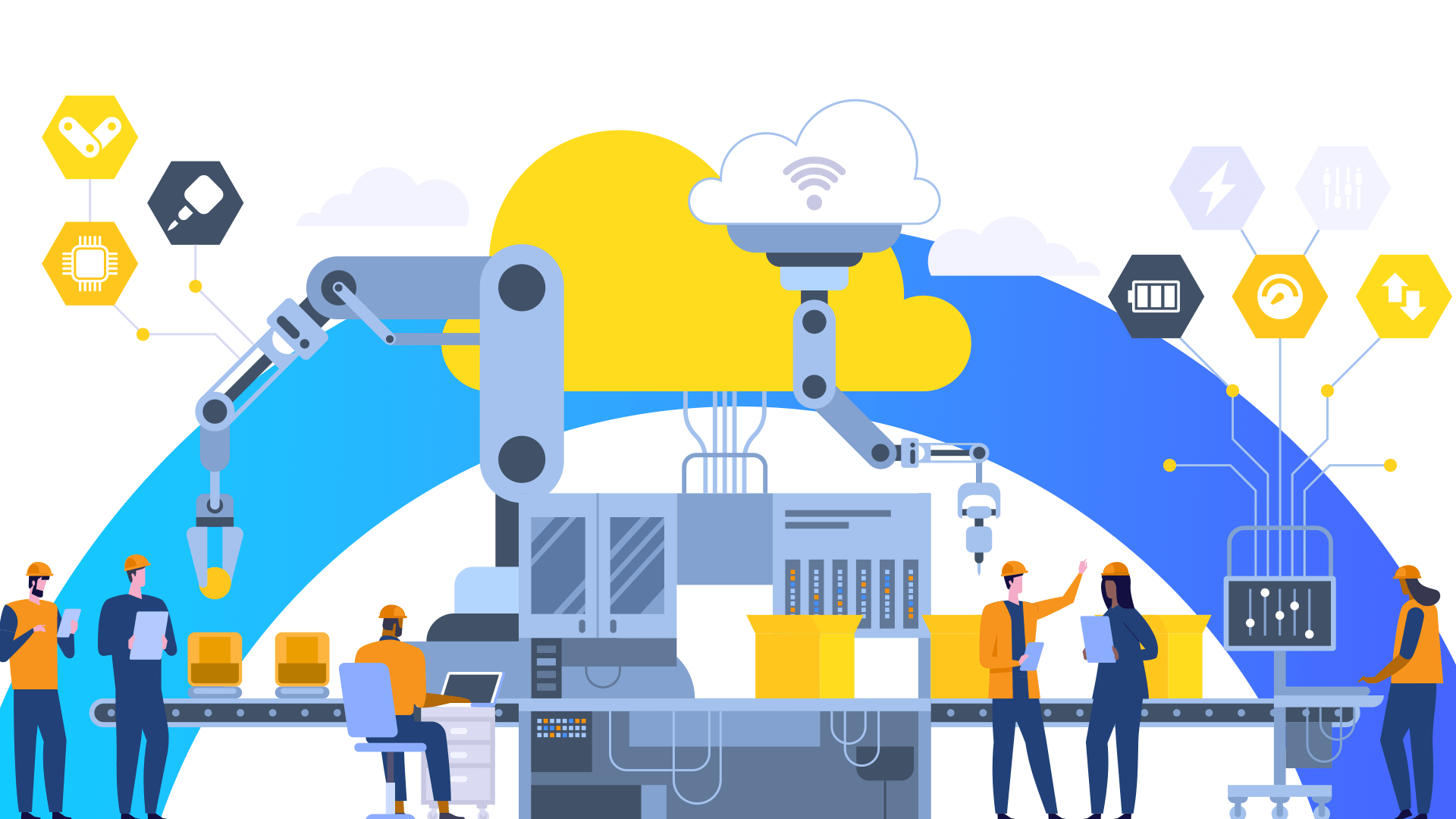How can manufacturers stay competitive in today’s fast-paced market? Digital transformation, powered by IoT, AI, and machine learning, offers the key to optimizing operations and enhancing decision-making. Want to learn how these technologies can reshape your business? Read ahead to discover more
Introduction
Digital transformation (DX) is creating an unprecedented shift in how manufacturers conduct business. DX works to make manufacturing sectors more efficient, agile and innovative by using advanced technologies to optimize operations, enhance decision-making and meet shifting market needs.
As global competition intensifies and customer expectations increase, manufacturers must embrace digital transformation to remain competitive. IDC has predicted for spending on digital transformation to rise at a rate of 16.1%, all the way up to $3.9 trillion by year 2027.
In this blog, we’ll be discussing the various digital transformation technologies and techniques that you as a manufacturer should keep an eye on.
In this blog, we will explore how harnessing data through a data analytics platform is the future. Here we’ll discuss the core features, benefits, and factors to consider while adopting a data analytics platform for industrial setups.
Understanding digital transformation in manufacturing

Digital transformation in manufacturing refers to using cutting-edge technologies to transform production. Such advancements include Internet of Things (IoT), artificial intelligence (AI), and machine learning (ML). These technologies, which automate workflows, improve quality control measures while providing real-time insight into production.
By adopting a digital-first strategy, manufacturers can realize seamless operations- from supply chain management to customer delivery.
Drivers of digital transformation
Several interrelated forces pivot manufacturers towards adopting digital transformation:
1. Evolving customer expectations
Consumers now demand customized products, faster deliveries, and seamless service. These demands must now be upheld by manufacturers, while still upholding quality and affordability. Digital transformation tools help analyze market trends, predict customer needs, and enable personalized production.
2. Global competition
The manufacturing industry is highly competitive. Companies must optimize efficiency, reduce costs, and innovate continuously in order to stay ahead of rivals. Digital transformation in manufacturing provides agility, allowing to adapt to changing market dynamics and outperform competitors.
3. Technological advancements
Rapid progress in technologies like IoT, AI, and ML has made powerful tools accessible and scalable. Such technologies allow manufacturers to analyze data in real time, automate processes, and reduce reliance on manual intervention.
4. Supply chain complexity
Modern manufacturing often relies on complex supply chains spanning various geographies. Digital transformation in manufacturing provides real-time tracking and optimization, ensuring efficient operations and timely deliveries.
5. Regulatory pressures
Stricter regulations on sustainability and product quality push manufacturers toward transparency and accountability. Digital solutions help monitor compliance and optimize resources for eco-friendly operations.
6. Workforce evolution
Younger workers prefer tech-driven environments. Digital transformation attracts talent by providing innovative tools, improving job satisfaction, and enabling upskilling through AR-based training and simulations.
Key technologies fueling the shift
- Industrial IoT (IIoT): IIoT connects devices, machines, and systems within a factory, enabling seamless data collection and analysis. Real-time monitoring minimizes downtime and supports predictive maintenance, leading to reduced costs and enhanced productivity.
- Digital twins: Digital twins create virtual replicas of physical assets, allowing manufacturers to simulate operations and predict potential issues. These models help optimize performance, identify bottlenecks, and ensure smooth workflows.
- Artificial intelligence (AI): AI enhances decision-making by analyzing large datasets and generating actionable insights. In manufacturing, AI aids in demand forecasting, process optimization, and defect detection, improving overall efficiency.
- Cloud computing: The cloud facilitates secure, scalable storage and real-time access to data. Manufacturers can share insights across teams and integrate operations globally for greater efficiency and collaboration.
- Data analytics: Advanced analytics tools enable manufacturers to extract meaningful insights from vast amounts of operational data, improving decision-making and forecasting accuracy.
- 5G connectivity: High-speed networks like 5G empower real-time communication between machines, systems, and operators, paving the way for smarter factories.
Benefits of embracing digital transformation
Digitizing manufacturing operations offers considerable advantages across operations, costs, and customer satisfaction. By automating workflows and using IoT for real-time monitoring, manufacturers reduce downtime and optimize production. Predictive maintenance and resource efficiency help lower costs while improving overall profitability.
Product quality is enhanced through AI-driven defect detection and digital twins. This simulates and refines product designs, minimizing errors and waste. Faster product development and improved customer satisfaction is the result.
With real-time data enabling quick responses to market shifts, agility is boosted, while cloud platforms enhance global collaboration. Workers are empowered through augmented reality-based training, improving safety and skills. Sustainability benefits include reduced waste, energy savings, and lower carbon footprints, aligning with eco-friendly practices. Additionally, digital transformation enables the delivery of personalized products and proactive customer support, improving overall experiences.
Finally, manufacturers position themselves for future growth by embracing scalable solutions, allowing them to experiment with new business models and integrate emerging technologies like 5G and AI. This transformation creates a foundation for long-term innovation and competitiveness in the industry.
Overcoming implementation challenges
Implementing digital transformation in manufacturing can present challenges. Resistance to change is common among employees unaccustomed to new technologies. Comprehensive training programs and strong leadership can ease this transition. Integration issues with legacy systems often slow adoption, but scalable platforms designed for interoperability can address these concerns. Cybersecurity risks also grow with increased digital connectivity, making robust protection measures essential.
However, a robust digital transformation platform, such as OmniConnectTM Data Cloud bypasses all of these challenges. OmniConnect™ overcomes the common challenges of digital transformation with its cloud-native, plug-and-play platform. By unifying IT and OT data, it ensures smooth integration with legacy systems and supports seamless device connectivity, enabling quick adoption and reducing resistance. Its no-code interface simplifies deployment and the SaaS model eliminates CAPEX, making it cost-effective. With built-in AI/ML readiness and robust security measures like zero-trust policies, OmniConnect™ empowers real-time decision-making while safeguarding data, ensuring secure and efficient digital transformation.
Steps to successfully implement digital transformation
- Evaluate current processes: Identify inefficiencies and areas for improvement.
- Set clear objectives: Define measurable goals like reducing downtime or improving output quality.
- Select appropriate technologies: Choose scalable tools that align with organizational needs.
- Encourage collaboration: Break down silos and foster cross-departmental communication.
- Invest in training: Equip employees with skills to leverage digital tools effectively.
Future of manufacturing
The future of manufacturing hinges on continued digital innovation. Emerging trends include 5G-enabled smart factories, autonomous robots, and AI-driven decision-making. Manufacturers must remain agile and adaptable to capitalize on these advancements. Those that embrace digital transformation will lead in efficiency, customer satisfaction, and market adaptability.
Digital transformation in manufacturing is no longer optional—it is essential for success. By adopting advanced technologies, businesses can unlock new levels of productivity, sustainability, and innovation.
Feel like you’re missing out on the advantages digital transformation poses for your manufacturing business? book a demo and learn more about OmniConnectTM Data Cloud.




